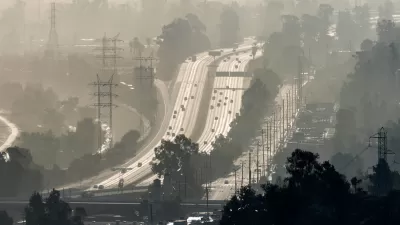Re-evaluating the role of planning in creating, and reversing, disturbing public health outcomes, like asthma rates among African-Americans in Philadelphia.

M. Sophia Newman explains the connections between planning decisions and the public health outcome of asthma rates.
More than 26 million people in the U.S. have asthma, a condition involving spasms in the lungs that makes breathing difficult; it’s among the most common chronic diseases in the country. May is Asthma Awareness Month when public-health officials hope to increase education about the condition.
The article focuses specifically on asthma rates in Philadelphia, which suffers the chronic ailment at higher rates than the rest of the state of Pennsylvania. African-American residents are particularly susceptible, caused by a century of planning and policy decisions.
The pernicious legacy of institutional racism has segregated communities of color in underserved neighborhoods in cities across the country — districts with poor-quality housing stock clustered near areas of heavy industry, transportation centers and other sources of air pollution. What’s ultimately at the core of addressing asthma and its disparities, according to a wide range of researchers, activists, and public health professionals, is not attention to race itself at all. Rather, useful interventions range from clinical care to housing policy to confronting corporate and government polluters.
The article provides insight into numerous potential solutions, both for individuals and at scale. Housing policies, such as improving the ability of tenants to remediate in-home triggers of asthma, figure prominently as solutions to the problem, as does dealing with air pollution sources that impact the public realm. On that latter point, Newman notes a lack of consensus: "The premise that outdoor air pollution aggravates asthma may be more controversial than any other in asthma care."
FULL STORY: Why Racial Disparities in Asthma Are an Urban Planning Issue

Maui's Vacation Rental Debate Turns Ugly
Verbal attacks, misinformation campaigns and fistfights plague a high-stakes debate to convert thousands of vacation rentals into long-term housing.

Planetizen Federal Action Tracker
A weekly monitor of how Trump’s orders and actions are impacting planners and planning in America.

San Francisco Suspends Traffic Calming Amidst Record Deaths
Citing “a challenging fiscal landscape,” the city will cease the program on the heels of 42 traffic deaths, including 24 pedestrians.

Defunct Pittsburgh Power Plant to Become Residential Tower
A decommissioned steam heat plant will be redeveloped into almost 100 affordable housing units.

Trump Prompts Restructuring of Transportation Research Board in “Unprecedented Overreach”
The TRB has eliminated more than half of its committees including those focused on climate, equity, and cities.

Amtrak Rolls Out New Orleans to Alabama “Mardi Gras” Train
The new service will operate morning and evening departures between Mobile and New Orleans.
Urban Design for Planners 1: Software Tools
This six-course series explores essential urban design concepts using open source software and equips planners with the tools they need to participate fully in the urban design process.
Planning for Universal Design
Learn the tools for implementing Universal Design in planning regulations.
Heyer Gruel & Associates PA
JM Goldson LLC
Custer County Colorado
City of Camden Redevelopment Agency
City of Astoria
Transportation Research & Education Center (TREC) at Portland State University
Jefferson Parish Government
Camden Redevelopment Agency
City of Claremont





























